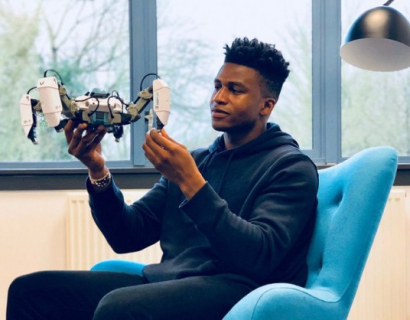Everything for  Business
Business
 Business
Business
This year, Mekamon's animal robots will become sensory. When the owners will stroke them on the head, they will rejoice. Already, these robots are able to be sad, if the owner does not play with them

This year, Mekamon's animal robots will become sensory. When the owners will stroke them on the head, they will rejoice. Already, these robots are able to be sad, if the owner does not play with them
Last March, in a cafe near the Four Seasons hotel bar in San Francisco, an unknown 25-year-old entrepreneur of British-Nigerian origin Silas Adekunle was preparing to meet with one of the Apple executives.
If he was nervous, then no one noticed. The young man smiled and opened a large suitcase. It was filled with colored robots, which at first looked like toys. When he took out one of them and put it on the floor, he came to life.
A robot named Mekamon, reminiscent of a spider, gracefully seeded on four legs, before bending over and dramatically shuddering in agony before dying. Adekunle took out his phone and pointed the screen at the robot, and he appeared on his screen surrounded by glowing lights in the face of an animated opponent with laser weapons.
Apple's chief communications officer, Ron Okamoto, looked carefully at the other robots, then dropped Adekunla with questions about the robot's mechanisms and arrangement. "There is an individuality in it," he notes.
The conversation, which was supposed to last 15 minutes, stretched out for more than an hour. At the end Okamoto uttered the words that every young entrepreneur would dream to hear with a team of nine: "You must come to us at Cupertino for a while."
A year passed and Adekunle, who entered the Forbes rating of "30 most successful business leaders to 30 years" in the "technology" category at the age of 26 , plans to sell a number of Mekamon robots through an exclusive distribution agreement that he signed in November 2017, spending "some time in Cupertino" and met with the heads of retailers Apple.
Apple, impressed by the quality of the robots with their accurately read, verified movements and the ability to express emotions, appreciated the four-legged "warriors" at $ 300 apiece and exhibited them in almost all of their stores in the United States and Britain. The first buyers are mostly computer specialists, but the number of parents who buy robots for their children is also growing, in order to provoke interest in exact sciences, says Adekunle.
During the first meeting at the Four Seasons Hotel, he did not yet know that Apple was going to launch ARKit, its first platform for augmented reality application. AR is a modern technology that combines digital animations with the real world on smartphones that has become popular thanks to the game Pokemon Go and which is supposed to be supplemented with the technology of tracking faces and objects in the new Apple iPhone X. Without a track record, Adekunle and his team of nine people suddenly started working with the world's largest brand.
Perhaps the robots already affect the management of warehouses in retail and other industries, but they are also gradually entering our homes due to the growing interest of people in handy things with artificial intelligence, like Alexa from Amazon. Adekunle hopes that his "humanized" spider robots will be as popular as the iRobot Roomba vacuum cleaner.
Trends testify to this. Analysts of the IDC predict that in the next three years the market of household robots will double. The next generation of robots with artificial intelligence will focus more on learning and interacting with family members, and less and less on solving physical problems, as says Jing Bin Zhang, director of research at IDC Worldwide Robotics.
In the morning of January 2018, Adecunl stands in the corridor of the company Reach Robotics in Bristol and looks at a piece of wire and melted plastic. This is the first prototype he made in the student hostel - he reminds the entrepreneur how much he managed to achieve during this time.
"My fingerprints were still on it," he says. "It looks awful.
Today's Mekamon looks more modern, something in between a crab and a spider, but unlike them, it does not have anything that resembles a pair of eyes or mouth.
There is a reason for this. "When I started to practice robotics, I really liked creating movements," Adekunle says. "People are used to awkward robots, and when you make them more realistic, they either lead people into raptures, or frighten them away."
Adecunl decided to make his robots mobile to get people's emotional response. "I love the movement," he says. Even when he first worked on prototypes of robots, studying at the University of Western England in 2012, some robotic animals, such as the robotic dog Aibo Sony, have already appeared on the market. The problem was that many of these personalized gadgets cost a fortune. The latest version of Aibo costs $ 1,700 plus a monthly fee.
Mekamon costs $ 300 (or £ 300 in the United Kingdom) and additional features will appear in future updates. "He gets angry if you do not play with him, and if he wins, his behavior changes," says Christopher Beck, co-founder and technical director of Reach Robotics.
This year the Mekamon robots will become sensory, that is, when their owners will stroke them on the head, they will demonstrate "happy" movements from side to side, like wagging their tail like a dog. The research team Adecunle draws his inspiration, watching the behavior of animals, for example, what horses do when they are nervous.
"Most of our products have emotions," says Beck. For example, sharp movements or stomping with feet can show aggression, while more quiet slow swings down and up suggests their breathing.
Headquarters Reach Robotics is located in a nondescript office complex near the motorway M3, leading to Bristol. A few dozen engineers sit in front of the iMacs screens in open-space, and the laboratory rooms for building models are still empty, except for the equipment stored in them.
Adekunle comes with a suitcase on wheels in the meeting room. This is the suitcase with which he came to meet Ron Okamoto from Apple. After a few moments, he takes out two new robots and inserts batteries.
After the charge, each robot begins to perform its own awakening movements. One raises his leg, pulling it, then shaking and leaning. "They can see each other," he says, "but we do not do anything about it yet."
If one robot wins a battle on the mobile gaming platform Mekamon, it can make an important appearance when meeting with another less successful partner.
Adecunl has already come a long way from early experiments in his teens, including a robotic arm made from canned food from baked beans, and a robotic face (based on the robot Kismet Cynthia Brezel of the Massachusetts Institute), which uses tennis balls and folded pieces of paper instead of eyes instead of the ears.
Back in Nigeria, when Adecunl was a child, he accidentally caused a power outage in the whole house when he connected the battery with spare wires to the outlet. "It's good that I did not get electrocuted," he says.
He was lucky that he grew up in a relatively prosperous family; his father was the director of the school, his mother worked as a midwife. But he lacked the technologies that children have today. He remembers that once someone brought a computer to primary school, and children had to pay to get acquainted with this novelty.
When the mother Adekunle moved to work in the UK, hard times came. There was no email, and the family could talk on the phone only once every two months. If, for some reason, his mother could not get to the landline phone, the Adekunl family had to wait at the other end of the world in complete ignorance of what was happening.
Two years later, when Adecunl was about 10 years old, he moved to the UK and went to secondary school there.
At home, he continued to work on his robots, drawing ideas from YouTube videos and using codes as a hacker-dilettante, not understanding the mechanism of their action; then at university he tried himself in C ++ programming, opening a huge number of new features. He began to experiment with the first moving models, which became the prototype of Mekamon.
In 2013, he met Beck, who worked on his thesis and had experience in robotics. He asked Beck to help him in the further development of Mekamon, in order to create a ready-made product.
"Everyone told us that it is too complicated and expensive, and no one will buy them," Beck recalls. - Manufacturers of toys that are stuck on their way, said that we should make them as cheap as possible. People will play with such a toy for five minutes, and then they will break it. "
But Adekunle and Beck believed that there is a market for more complex products, for example, robots with 12 motors, while the most complex drive toy has only five.
"If you look at other robots, they create a lot of noise or make some kind of noise, and it can be funny for one month," Beck said. "There is no connection between robotic toys and high-tech products that cost thousands and are designed for fans."
No one dared to do such a daring. "There are robots with legs, but they do not move so well," says Beck. "Or they walk in such a way that they can not be" revived ". We animate robots. "
Adekunle, who left for a while, opens the door and tells Beck that soon there will be some potential investors. Both sit in their comfortable cafe in anticipation of a meeting.
In the future, Adekunla hopes to attract more investment (already invested $ 10 million), as well as enter into licensing agreements with entertainment companies in Asia. Over time, he plans to release proprietary versions of Mekamon robots, such as Pokemon characters.
"Asia will be a huge market for them," says one of the investors Reach Robotics and former CEO of Atari, David Gardner.
At the moment, Reach Robotics continues to earn direct sales of its products to consumers and on an exclusive agreement with Apple Retail.
"The partnership with Apple is very fruitful," Adekunle says, adding that he expects continued cooperation. "We have a lot of products that we would like to put on the market," he says. "We are following this situation."
Forbes.ru
 What are you doing with your RV in the offseason?
What are you doing with your RV in the offseason?
 Adobe will buy online design startup Figma for $ 20 billion
Adobe will buy online design startup Figma for $ 20 billion
 To combat the gas crisis, Germany offers a new plan for cheap transit
To combat the gas crisis, Germany offers a new plan for cheap transit
 Porsche family seeks iPO buyout after tearful defeat
Porsche family seeks iPO buyout after tearful defeat
 Clubs and bars are popping up all over Manhattan, providing an alternative social hub and jobs.
Clubs and bars are popping up all over Manhattan, providing an alternative social hub and jobs.